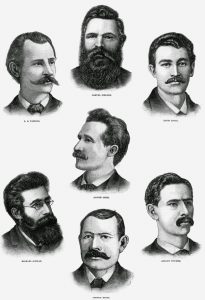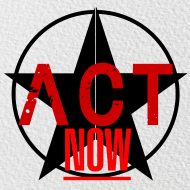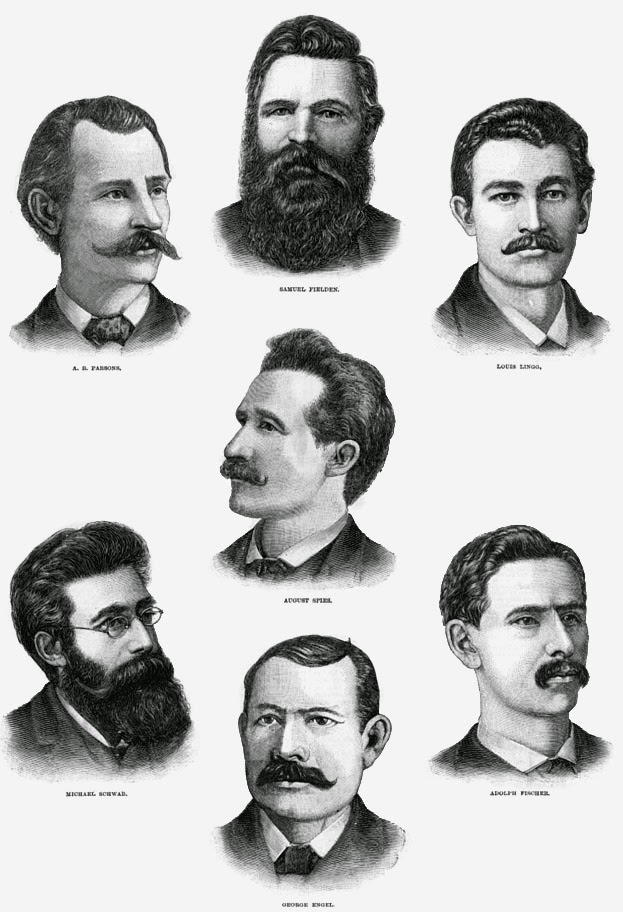May the 1st, 1886- “Eight hours for work. Eight hours for rest. Eight hours for what we will.” was the watchword of the day. Across the United States of America, up to half a million workers went on strike for the eight-hour day. This was a momentous achievement for the American labour movement, but the events that this day would set in motion would have enormous implications for workers across the entire globe.
In Chicago, the workers of the McCormick Harvesting Machine Company had been locked out since February and had become famous for their militancy. As a result of this, over four hundred police officers were deployed on May the 1st to defend the strikebreakers that had been hired from harassment and assault as they crossed the picket line. Despite the overwhelming police presence, half of the strikebreakers were pressured by the workers into joining the strike. Perhaps embarrased by their own failure, two days later on May the 3rd, the police fired upon the striking workers, murdering two of them.
Outraged by this atrocity, local anarchists called for a rally at the Haymarket Square the following day, May the 4th, which was attended by a crowd of 3000. The police arrived to violently disperse the rally, but were stopped when a demonstrator threw a homemade bomb, killing one officer instantly and mortally wounding six others. Angered, the police began to fire indiscriminately at the rally, killing four and injuring at least seventy (most injuries went unreported since many people avoided seeking medical attention out of fear of arrest), but some of the demonstrators were armed and fought back; over 60 officers were injured during the firefight, though a larger number of these injuries resulted from friendly fire. The police were forced to retreat, and the remaining demonstrators soon cut their losses and left the square.
Humiliated by their defeat, and under increasing pressure from their capitalist backers who feared the potential success of the eight-hour-day movement, the police cracked down visciously against unions and striking workers. As part of this harsh anti-union campaign, eight anarchists were framed as being responsible for the bombing and following firefight; there was no real evidence supporting this accusation, and there was plenty of evidence to prove their innocence, but a deliberately biased jury was selected (hundreds of jurors were rejected for showing any sympathy to the accused) and the anarchists were found guilty as to set an example to frighten any worker who dared to oppose the exploitative capitalist system. The eight anarchists, particularly the four who were executed on November the 10th, 1887, became known as the ‘Haymarket Martyrs’.
For the fourth anniversary of the general strike of 1886 (May the 1st, 1890), the American Federation of Labour proposed an International Workers’ Day to honour the Haymarket Martyrs. This day, the first May Day, was an overwhelming success, and it has now been repeated annually for well over a hundred years, with millions of workers participating each year globally.
For us here in South Wales, the lessons that can be drawn from the story behind the first May Day are especially poignant. From the murdered workers of Chicago, to the beaten and arrested miners of Wales, it’s been made clear again and again that the primary purpose of the Police is to protect the property and profits of the rich, and that they are more than willing to commit unspeakable acts of violence to do that. It’s also been made clear that sometimes we must be prepared to defend ourselves; the demonstrators at the Haymarket Rally likely prevented a massacre at the hands of the police by daring to fight back, and fascism spread far less virulently in Wales during the early 20th Century than in other areas of the UK due in no small part to the beating that Oswald Mosley and his blackshirts received when they tried to speak at Tonypandy in 1936. Let’s celebrate the history of the Haymarket Martyrs, as well as the history that surrounds us on every street, road and hillside, and remember the lessons that this history has taught us; don’t trust cops, beat up fascists, fight like hell and you might just change the world.


